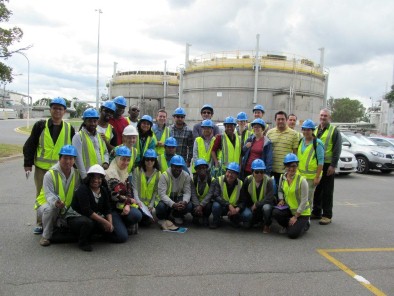IWC became a partner organisation of GWP in 2012, and a Memorandum of Understanding was signed between the two organisations. The aim of the collaboration is to support women water leaders from developing countries in their post-graduate studies on Integrated Water Resources Management (IWRM) and to assist with implementing GWP’s strategic goal of addressing global, regional and local water challenges around the world.
IWC offers full-tuition scholarships for the Master of Integrated Water Management programme (MIWM) every year, and Reba Paul was the first person to receive a scholarship through the GWP collaboration.
The GWP-IWC scholarships are aimed primarily at women already working in the water sector who need to acquire specialist knowledge of integrated approaches to managing water resources, especially relating to national policy development across the GWP regions. From 2014 there will be a second scholarship opportunity between GWP and the Ken Thiess Scholarship Fund.
For more information about the programme and instructions how to apply, please visit the IWC homepage. Deadline for applications is 13 September 2013.
IWC is a joint venture of four leading Australian universities: The University of Queensland, Griffith University, Monash University and the University of Western Australia. Students who complete a programme at IWC receive a co-badged degree from all four universities.
Reba’s story
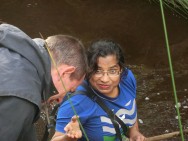 Reba Paul is a Civil Engineer from Bangladesh, specialised in Environmental Engineering. She has over 15 years of experience in IWRM and has been involved with GWP for more than 10 years.
Reba Paul is a Civil Engineer from Bangladesh, specialised in Environmental Engineering. She has over 15 years of experience in IWRM and has been involved with GWP for more than 10 years.
During this time she has promoted IWRM locally, nationally, regionally and globally. She was the Country Coordinator of Bangladesh Water Partnership and Regional Programme Coordinator of GWP South Asia. Before embarking on her studies in Australia she also helped set up the Bangladesh Water Integrity Network (BAWIN) under Transparency International Bangladesh, and she worked for WaterAid in Bangladesh as its Head, Policy and Advocacy. In the attached video interview, Reba talks about the water issues facing Bangladesh today.
In February 2013 Reba enrolled in the IWC Master of Integrated Water Management programme, to further her career in water resources management. She describes her studies in Australia as unique, thanks to the collaboration between the universities:
“The beauty of the programme is that it is jointly run by IWC and the four top universities in Australia, which gives a good flavour of cooperation and collaboration between academicians and practitioners to build future water leaders. Through such collaboration, the students can get a good mix of professors from various disciplines”.
During her first semester, Reba took four compulsory courses: “Science of water”, “Project Management”, “Water, sustainability and development” and “Water Governance and Policy”. Reba says she found the courses very intensive and interdisciplinary, covering a wide range of topics and emerging water issues.
“The programme not only provides for academic learning, it also gives the students a great opportunity to learn practically in the field. I very much enjoyed the field studies and I learned about water problems in Australia and the development and management of them. Australia, being a developed country, has the capability to adopt very high tech water solutions, but it’s good to know that they are very much concerned about community participation in the sustainability of water infrastructures and management. There are many successful examples”.
In addition to courses and field visits, IWC also provides its students with a range of learning material developed by experts and module readers. Reba says she finds the online resources of University of Queensland amazing.
“There are many peer review articles provided by the professors and also as online resources to learn about the courses in depth. There is no lack of resources - more lack of time to study all the materials”.
Tomorrow’s water leaders
Developing leadership skills are a fundamental part of the MIWM programme, and essential for stimulating and managing the change required by the integration agenda.
“We are very fortunate to get the opportunity to learn about leadership challenges, especially learning and practicing transformational leadership, peer review and influential leadership. I hope IWC will further elaborate this part and that more time can be allocated for this. I felt I needed especially to learn more from this part of the programme”, says Reba.
Reba will receive her Master of Integrated Water Management degree in July 2014, when her course finishes. She hopes that her studies will lead to an international job in the water sector. She has already started to plan for her final study project.
“The courses during the first semester and introduction of the second semester courses have helped me identify my final project. I am planning for a final project on efficient urban water and energy management in South Asia”.
For those interested in becoming future students of the MIWM programme, Reba says the course is easy to follow if you have some experience in the water sector. She says that GWP and IWC have been very supportive throughout her studies.
From her previous experience of working with GWP, Reba thinks that the IWC scholarship addition to the GWP programme will add tremendous value in promoting IWRM around the world.
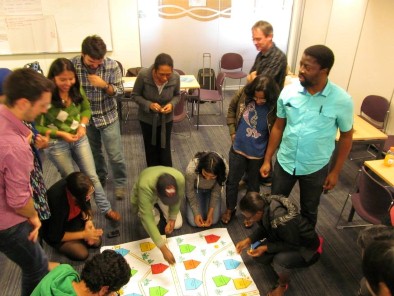 Group work in class
Group work in class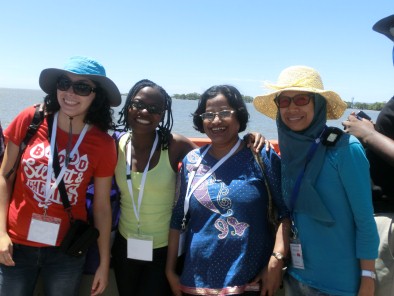 Field trip to North Stradbroke Island
Field trip to North Stradbroke Island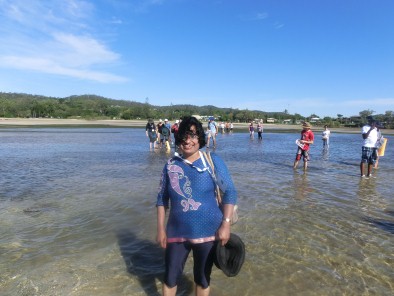 Reba on North Stradbroke Island
Reba on North Stradbroke Island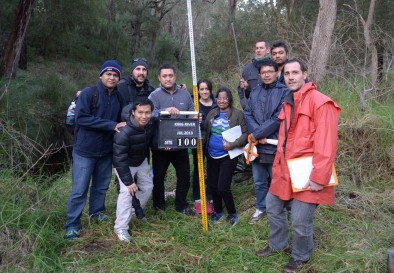 Field trip to Albany
Field trip to Albany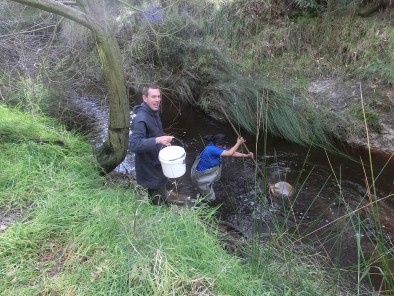 Water studies in Albany
Water studies in Albany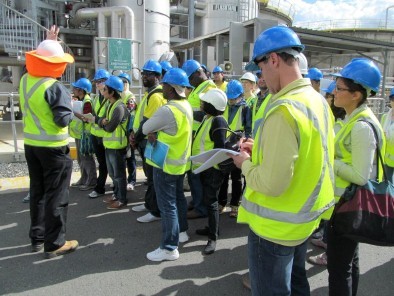 Briefing on Thermal Hydrolysis in Oxley Creek
Briefing on Thermal Hydrolysis in Oxley Creek

